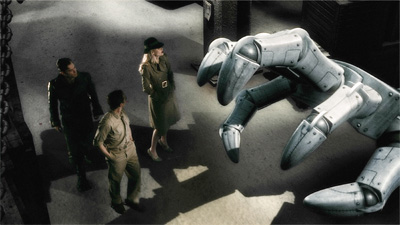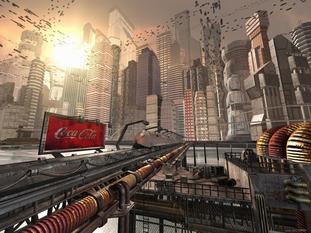Sky Captain and the Past-Futures of Today

I saw this little art-house film yesterday entitled "Sky Captain and the World of Tomorrow."
I loved it.
Even as a kid I always found past-futures (visions of the future from the past that aren't quite accurate) to be fascinating. When I was in the fourth grade I had this school notebook that had a picture of an early 60’s era past-future that always set me to daydreaming. I would scan it and show it to you now, but the teacher confiscated it.
It was an impossibly green and well-manicured landscape under a crisp blue sky. The scene was populated with crewcutted men in silver jumpsuits - the women had different hairdos, but the same jumpsuits - all happily filing in and out of a monorail station in a futuristic metropolis. Another part of the monorail station was devoted to the landing and taking-off of flying cars.
Like this, but utopian:
“Sky Captain” represents an earlier past-future - the future of the earliest pulp science fiction magazines. An art deco future not unlike that shown in the Fleisher-era Superman cartoons.
This film will win an Oscar for art design. Even if it hadn’t had an interesting plot, this movie would be popular just for the images it gives us.
This film also gives us characters to root for. Gweneth Paltrow’s “Polly Perkins” character is a direct descendant of Fleischer’s Lois Lane - fearless to the point of recklessness - a liberated damsel in distress. Sky Captain is a superhero like Batman. The superhero that any of us could be if only we had those cool gadgets and lived in a world populated by fantastic weirdness and warped Tesla-esque evil geniuses. Sigh.
And this is unusual, there’s also a story here. I’m not going to give it away, but take "Lost Horizon," "The Empire Strikes Back," the Indiana Jones movies, "Rocketeer," and those Fleischer Superman cartoons…
Mix well and enjoy.
Past-futures is a sub-genre of science fiction that is not often seen in films. It is especially suited to comic book, pulp, or serial style story telling. But I believe that science fiction filmmakers will turn to this style more often as our ability to forecast the future grows shorter and shorter. Even Star Trek is becoming a past-future.
Science fiction allows us to dream of the future. And dreams don’t have to be realistic to be important.
UPDATE: James Pinkerton at Tech Central Station has published an article entitled "Future Shock, for America?" that reads way too much into the past-future of Sky Captain:
A culture which prefers the languorous comfort of a quasi-mythic past to the rigors of confronting the hard-edged future is complacent, maybe even decadent -- and out of decadence comes defeat. But more on the Iraq war in a bit. Also, more on America's shrinking back from the next quantum leap of biotech development.
The appearance of a single movie does not portend the demise of our civilization, even if it's Fahrenheit 9/11, but especially if it's just light entertainment.
It gets worse:
But Americans seem immersed in a culture that looks backward to the bygone Bijou days when a plucky pilot in a prop plane -- be it Harrison Ford in the "Raiders" movies or Jude Law in "Sky Captain" -- can save the world, and so maybe it isn't surprising that military transformation has suffered from vision-fatigue. Indeed, the sub-Mach One "Sky Captain" lumbered to a first-place finish at last weekend's box office rankings -- at a time when we need Klingon cruisers to strike fear, or death, into our enemies.
I wonder how the Congressional Budget Office would feel about that expropriation. Pinkerton concludes:
In the meantime, even if Japan fails, would it be wise to bet against the rest of the Asian economies -- ruled as they are by secular pragmatists who are out to get rich, open to any technology? Certainly not, especially when Americans, complacently obtuse about the risks they face, are blithely determined to spread the blessings of democracy, corpse by costly corpse, across the Middle East.If present trends continue -- Americans thinking about the 1930s, Asians thinking about the 2030s [as evidenced by their Ghost in the Shell movies]-- then the world's political economy is headed for a major reversal of fortune. It doesn't take much of an imagination to see that tectonic jolt coming.
The past-futures sub-genre of sci-fi is clearly not about the past. I studied American history and I don't recall giant robots ever walking the street of New York City. It's not about the literal future either. Nobody, except for maybe ten-year-old boys in 1939, ever thought that the future would look like Sky Captain. It's a comic book put on film, not a serious statement about our present hopes and dreams.
I can imagine a film – like a retro Bladerunner – that uses the past-futures genre to make a serious artistic statement. Even if that more serious film were popular, it would not mean we are obsessed with past glories. At it's most serious, past-futures fiction can be a translation of futuristic ideas into a mythical or metaphorical language for today.
Not understanding this is the equivalent of dismissing "The Lord of Rings" trilogy by saying "that never happened."


Comments
We saw it this weekend and enjoyed it greatly, but I couldn't help thinking the whole time that Jennifer Jason Leigh would have been a better choice for Polly, based on the character she played in "The Hudsucker Proxy".
Posted by: Virginia Warren![[TypeKey Profile Page]](http://www.blog.speculist.com/nav-commenters.gif) |
September 20, 2004 12:40 PM
|
September 20, 2004 12:40 PM
When I was doing my master's degree, the original idea for my thesis was a study of "failed" visions of the future -- what they have to teach us and why they are almost always more aesthetically appealing than the real world. (I ended up getting really interested in the breakdown in communications that surrounded the decision to launch the Space Shuttle Challenger, and wrote about that, instead.)
It's not hard to find such visions. Almost anything written about "the future" or "the year 2000" back in the 50's, 60's, and 70's is wrong, often amusingly so. I would agree that Star Trek has become a past-future. At this point, so has Cyberpunk. That's why it's great writing about the Singularity. All we can say is that we don't havy any idea what the future will be like. The current generation of futurists may be the first ever to get it right!
Note to Virginia: I have been hoping for years that when they make a new Superman movie, they would cast Jennifer Jason Leigh in the role of Lois Lane based on her performance in The Hudsucker Proxy. Unfortunately, I don't think it will ever go that way. Because of the success of Spider-Man, I think the next few superhero movies will feature very young protaganists. The new Batman movie is supposedly going to be about his first year in the biz. They will no doubt do the same with Superman.
It's too bad, because Amy Archer (Leigh's character in HP) would have been more than a match for Superman. And she would have eaten Jude Law for breakfast.
Favorite speech:
Posted by: Phil Bowermaster![[TypeKey Profile Page]](http://www.blog.speculist.com/nav-commenters.gif) |
September 21, 2004 12:20 PM
|
September 21, 2004 12:20 PM